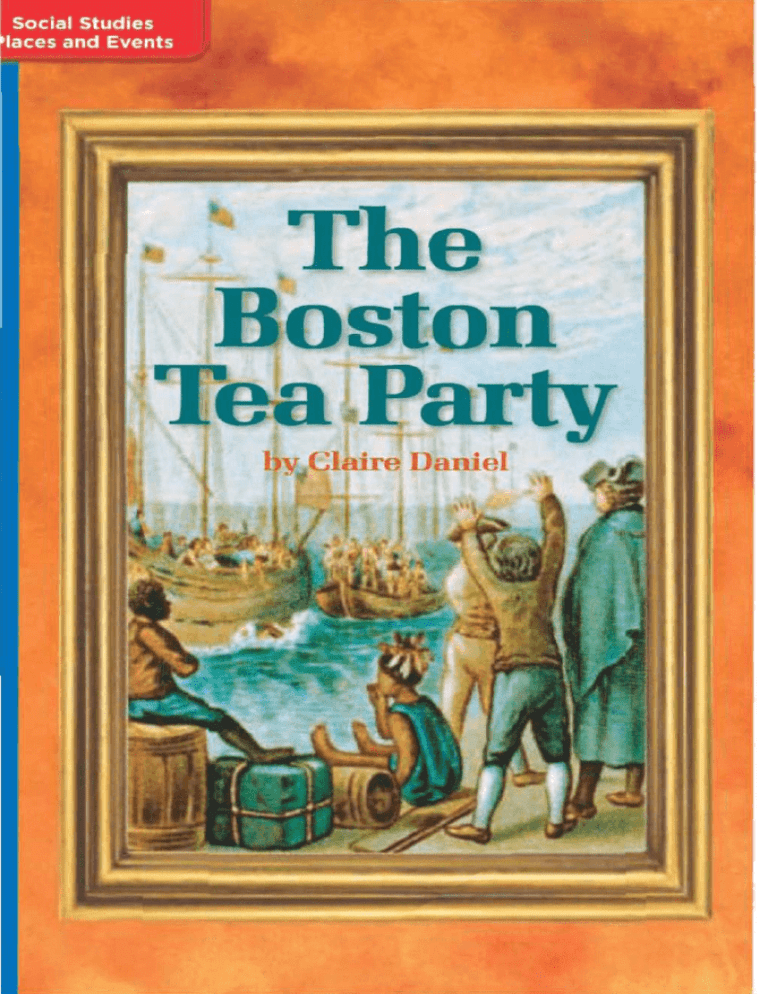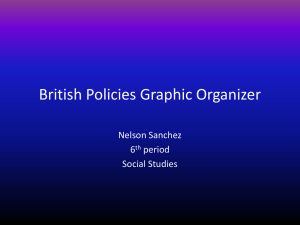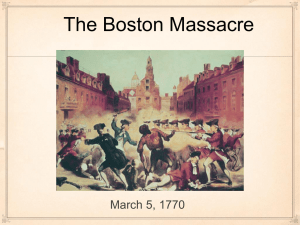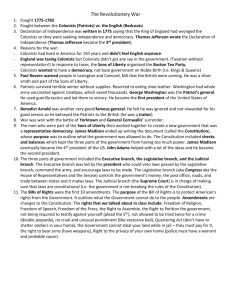
Did You
Know?
Paul Revere, who
is famous for his
Midnight Ride, was
one of the men
who dumped tea
into the sea at the
Boston Tea Party.
Phot o graph y Credi ts: All photographs are by Mocmilian/McG raw -Hili School D ivisio n (MM H)
excep t as noted below:
4 ; © Visual Ar t s library (London)/Alamy. 5:@ NorthWind/NorthWind Picture Archives.
7: © North Wind/ N orth Wind Picture A r chives. 9: © North Wind/N orth Wind Picture Archives.
10-11: © Superstock. Inc./Superstock. 12: © North Wind/North Wind Picture Archives.
13: © Superstock. Inc./Superstock. 14 : © N o r th Wind / North Wind Picture Archives.
illustration Credits: 3: XNR Productions. Inc.
The McGraw-Hili Companies
_
D
Macmillan
McGraw-Hili
Copyright © by The McGraw-H ili Compa nies, Inc. All rights reserved . Permission is
granted to reproduce the materia l contained herein on the condition that such materia ls
be reproduced only for classroom use ; be provided to students, teachers, and fami lies
without charge; and be used solely in conjunction w ith the Timelinks program . Any
other reproduction, for sale or other use, is expressly prohib ited .
Send all inquiries 10:
Macmillan/McGraw-Hili
8787 Orion Place
Columbus, OH 432 40-4027
ISBN: 978-0-02-151960-6
MHID : 0-02- 151960-9
Printed in the United States of America.
I 2 3 4 5 6 7 8 9 10 109 100908 07 06
The Boston
Tea Pal~ly
by Claire Daniel
Contents
British Taxes .......... . ... . ...... 2
Against Taxes ..................... 4
Brave Actions ..................... 8
The Fight for Freedom ........... 14
Glossary ... . . ................. . . 16
British Taxes
In 1763 America was a British colony.
However, the American colonists were not
happy. The colonists had helped Great
Britain win a war with France. However,
the Bri tish government decided to tax the
colonists. This would help the British pay
for the costly war.
In 1764 the British passed the Sugar Act.
This act placed a special tax on sugar.
In 1765 the British passed another act
called the Stamp Act. It said that colonists
had to pay for a special stamp on paper
items, such as newspapers and letters.
Then the British passed the Quartering
Act. It said that colonists had to give British
soldiers food and a place to stay. The
colonists were angry that they had no
say in these new laws.
AT1.ANTIC
•
110
1?'1IIIIrs
~
o
101 ltIldlolntltn
Against Taxes
Most colonists did not agree with the
new laws. They wanted to make changes,
so they formed secret groups. One of these
groups was in Boston. The group called
themselves the Sons of Liberty.
The Sons of Liberty attacked a British
building and a home in August 1765. Then
they printed news about how they had
fought against the British. The news spread.
The Sons of liberty held meetings to talk
about why British taxes were unfair.
Soon more groups began to form.
Many colonists decided not to pay
the taxes. The British
government was angry.
The British felt that
these groups had too
much power.
In 1766 the British
government ended the
stamp tax. However, the
British passed the Townshend
Acts. Now the colonists
had to pay heavy taxes
on glass, lead, paint,
paper, and tea.
People carried signs to speak
out against the Stamp Act and
other British taxes.
Samuel Adams started
a secret group called
the Sons of Liberty.
Samuel Adams was one of the first Sons
of Liberty. He spoke out against the British
taxes. Adams and others felt that the British
government should ask the colonies before
passing new laws about taxes. The colonists
also thought that they should have some say
in how the government ran the colonies.
To get the government's attention, many
colonists stopped buying glass, lead, paint,
and paper. Finally the British government
ended most of these taxes.
A patriot named Paul Revere created this print to show
others what happened at the Boston Massacre.
In 1770 British soldiers came to Boston.
On March 5 an angry crowd gathered.
Soldiers fired at the crowd, and five
colonists died. This became known
as the Boston Massacre.
Then, in 1773, the British government
passed the Tea Act. The colonists did not
want to pay a tax on tea. In early November
ships filled with tea arrived. The colonists
would not pay the tax. Much of this tea
was sent back to Great Britain.
Brave Actions
On November 27 three ships carrying
tea sailed into Boston. The Sons of Liberty
held a meeting to talk about what to do
next. Meanwhile other colonists stopped
the ship's crew from unloading the tea.
On December 16 the colonists met at
the Old South Meeting House. The owner
of one ship filled with tea told them that
he would not take the tea back.
That night a group of about 50 men
painted their faces. They threw blankets over
their backs. They carried axes in their hands.
These men were pretending to be Native
Americans. Yet they were actually patriots
fighting against the British. The patriots
headed toward the dock. They quickly
boarded the first ship.
o
A group of men with their faces painted like
Native Americans boarded the British tea ships.
Meanwhile colonists gathered around the
ships. They knew something important was
going to happen. After all, the ships carried
tea. The British had placed huge taxes on
this tea. The colonists knew the patriots
were going to make sure the British knew
how they felt about the tax.
The patriots broke open the boxes
of tea and threw them overboard.
The tea on the ship was locked up. The
patriots asked the captain for the keys. He
was afraid, so he gave the keys to them
right away.
The patriots found the chests of tea.
They broke the chests open with their axes.
Then they tossed the chests over the side
of the ship.
The ship's crew stood by as the patriots
threw the chests into the water. Some say
the crew even helped to toss the chests over.
A crowd watched from the dock in silence.
Then the patriots moved on to the other
two ships . In all they threw about 342
chests of tea into Boston Harbor. The tea
was ruined, and the fight against the British
had begun.
French
and Indian
War ends
1763
1764
Stamp
Act
1765
Sugar
Act
Townshend
Acts
1767
1770
Boston
Massacre
The British government decided to
punish the colonists for the Boston Tea
Party. They closed Boston Harbor. No
ships could come in or go out. Colonists
were not allowed to meet in groups. British
soldiers could even enter a person's home
to sleep or eat whenever the soldiers
wanted to do so.
Coercive Acts
First
Continental
Congress
1773
1774
Boston
Tea Party
1775
Colonies
declare
independence
1776
Battles at
Lexington
and
Concord
American
Revolution
ends
1783
The Fight for Freedom
The British sent more soldiers to the
colonies after the Boston Tea Party.
Colony leaders met and formed their own
army and navy. George Washington was
chosen to lead the army. The patriots
were ready for war.
On April 19, 177 5, British soldiers
marched from Boston to
Concord. A battle began along
the way, and some colonists
died. The British soldiers
marched on. They
found a group of
angry colonists
waiting for them
in Concord.
George Washington
became the leader of
the colonies' army.
Both sides lost men in that battle. As
it got dark, the British fled to their ships.
The war had begun.
In 1776 colony leaders signed the
Declaration of Independence. This
important paper said that the colonies were
free from Great Britain. The war was long,
but the colonists never gave up. In 1783
the colonists won the war. Ten years after
the Boston Tea Party, the patriots created
a new natlon.
The American
Revolution soldiers
fought for the
freedom we
have today.
Glossary
colony an area that is controlled
by another country
independence freedom
liberty freedom
patriots people who were loyal
to the colonies and fought to
defend them
punish to make someone paywith money or actions-for
something he or she has done
tax to charge people extra money
for things they buy or money
they earn. This extra money
goes to the government.
~c.tivit;es
Check Understanding
1. Recall Why did the patriots throw boxes of
tea into the water?
2. Analyze Why did the Boston Tea Party
patriots dress as Native Americans?
3. Reader Response Do you think the Boston
Tea Party would have happened if the
British had not taxed the colonists? Why
or why not?
~
Reading Skill
\t:iJiI
Sequence of Events List
the following events about the
Boston Tea Party in the order in
which they happened:
First
Nex t
Last
• The Sons of Liberty group formed.
• The British taxed the colonists.
• The colonists dumped tea into the water.
• The colonists stopped buying taxed things,
such as glass.
~
'\iiiiI
Writing in Social Studies
Speech You are Samuel Adams. You
have to give a speech to the Sons of Liberty.
Write a short speech. Tell why you think the
taxes are unfair.








